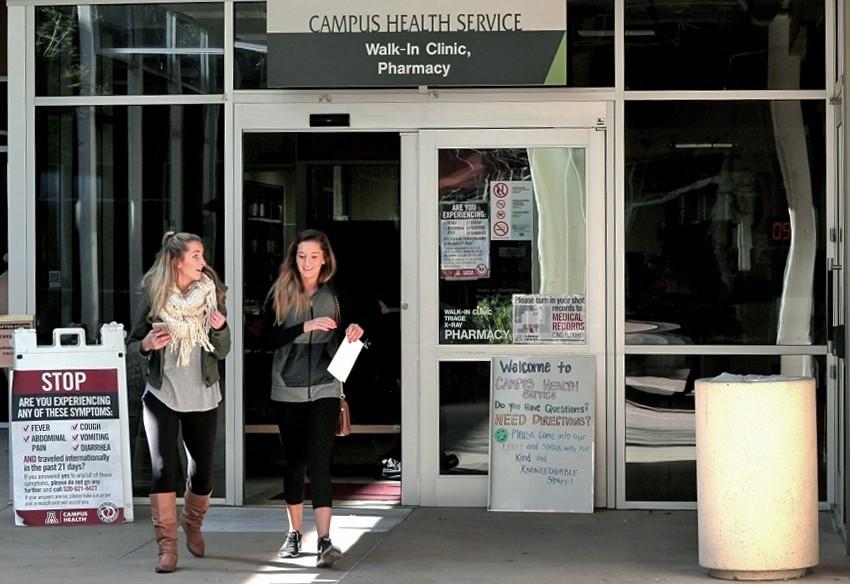It is no secret that there is a culture of substance use in college. For students recovering from substance abuse, safely navigating the college environment can be an arduous task.
Nicholas Tucci, a student at the University of Arizona, had been sober for one month when he began attending UA. While everyone around him traversed the social spheres, Tucci was feeling overwhelmingly isolated.
“I saw everybody making new friends and college buddies, and I was stuck in my room with my weird roommate who kept drinking fifth after fifth,” Tucci said. “I met this one really nice dude on campus who was also sober, and he brought me to Wildcats Anonymous.”
RELATED: Wildcat Alum makes a scene in Dames at Sea!
Wildcats Anonymous is a student-led, program under Campus Health Service with the mission of helping willing students achieve and maintain sobriety so they can live a happy college life.
The program began nearly four years ago, thanks to the Transforming Youth Recovery Grant, the Governor’s Office Grant for Collegiate Recovery and the dedication of counselors and students in recovery.
What differentiates Wildcats Anonymous from the traditional Alcoholics Anonymous programs is the wealth of activities and guidance that the program offers specifically for college students.
In addition to biweekly anonymous meetings and AA meetings for friends and family of substance abusers, Wildcats Anonymous provides a multitude of “replacement” activities like paintball, escape rooms, hiking trips, meditation classes and krav maga classes — all sober, fun and completely free.
“If someone told me that the only thing I have to do at a university on a Friday night was drink and party, I would not have stayed sober,” said John Fritsche, a senior at the UA and an executive director of Wildcats Anonymous.
According to Fritsche, it can be hard to find affordable things to do on weekends in a new city. For someone in recovery, going back to parties or going out on Friday nights could result in a relapse, but stewing in the dorms is not healthy for someone who is still experiencing intense cravings.
“The reason [free sober activities] are so important is because people in early recovery usually struggle to break their former cycles,” Fritsche said.
RELATED: Artist brings Tucson back to the past with new exhibition
For the past two years, Wildcats Anonymous has offered a free “alternative Spring Break” for its participants and will likely continue this tradition. So far, they have gone whitewater rafting and visited Zion National Park.
Another unique feature of the program is peer mentoring.
“Peer mentoring is halfway between something and nothing as far as getting help goes,” said Sam Harwood, the Wildcats Anonymous administrative director. “This is a good first step for people who aren’t comfortable with fully moving forward yet.”
A peer mentor is a current or former UA student with at least one year of sobriety under their belt whose job is simply to be there for students in recovery. Peer mentors help students find ways to get sober and share their own experiences, aiming to give them the motivation and the hope to take steps forward.
“When I was using, I was always really skeptical of authority, so I refused to say that I needed help,” said Rohith Boyilla, a UA student and event coordinator for Wildcats Anonymous. “[Peer mentoring] wasn’t as foreboding as having to go to a therapist or commit to meetings. I felt less alone when I realized that someone messed up just as bad as me and that they are all right.”
Wildcats Anonymous’ main goals right now are to try to create a 24-hour “hang-out” space for students in recovery and, hopefully, to begin a sober housing program on campus. The program is also organizing their very first fundraising event in the spring to keep the program going, should grant money ever fall short.
Wildcats Anonymous emphasises willingness in the program, because it is simply not effective to force someone into sobriety unless they truly want it. Therefore, it is important that students are aware of the program’s existence, so that if they find themselves in need, they know where to turn.
Fritzsche said his highest goal for the program is to provide a community for students in recovery, because he knows what it is like to feel sober and isolated in college.
“Don’t try to go through this alone,” Fritsche said. “I’ve been to the funerals. Don’t become another person that goes down that path. Just ask for help.”
In its earliest stages, one of the founders had a saying that fueled the program for years: “If we can help just one person achieve sobriety, then it all is worth it.”
“This is a subject that touches everyone,” said Lynn Reyes, a substance abuse counselor for Wildcats Anonymous. “We all know someone involved in this, whether you are aware of it or not.”
Open Wildcats Anonymous meetings are Wednesdays from 7:30-8:30 p.m. and Fridays from 9:30-10:30 p.m. in Campus Health room B307. Closed meetings are every day from 12:10-12:50 p.m. at United Methodist Church.
If students or their friends think they may have a substance problem, Wildcats Anonymous recommends going to their website for additional resources.
Follow Daily Wildcat on Twitter









